Second Season of HSE Summer University Opens
On June 20, HSE Summer University classes began. In comparison with last year, the university has seen an increase both in the number of participants and in the diversity of courses offered.
According to the organizers of the Summer University, the programme is growing not only due to the number of visiting students (this year there will be twice as many as in 2014), but also due to the geographic representation of participants. More than 90 participants from 12 countries – Algeria, Brazil, Bosnia, China, Denmark, Italy, Germany, the Netherlands, Norway, Pakistan and the United States – will take part in the Summer University. The largest contingent is from the Republic of Korea, with 26 students from the Seoul National University of Science and Technology having already arrived and students from Seoul National University due to arrive in a few days.
In addition to economics, sociology and cultural studies, the curriculum includes courses in computer science, among them the theory of computation, statistical diagnostics, natural language processing, and others. Participants in the Summer University will create their own curriculum, combining courses from different subjects and obtaining ECTS credits for them that can be transferred to their home universities.
Another feature of the Summer University 2015 is that students learn not only in Moscow, but will also spend a week in St. Petersburg where they will hear lectures from leading teachers at HSE’s St. Petersburg campus.
‘HSE is a young and very ambitious university. For 20 years, we have ensured that we are known not only in Russia but also abroad. And your participation in the Summer University is further proof that the policy of internationalization works’, said Vadim Radaev, first vice-rector of HSE.
‘The HSE Summer University is gaining speed’, said Sergei Erofeev, Vice Rector of HSE. ‘In 2015, we not only took in twice as many students from different countries. The novelty lies in expanding the geographic representation and scope, as well as passage to self-sufficiency. A successful Summer University 2015 will enable HSE get closer to its target of implementing the practice of the summer semester in Russia. It gives the opportunity to study under individual plans in an intensive format that is interesting to different audiences – both foreign and Russian students. In addition, the summer semester is an opportunity to receive additional credits and make one’s educational path more flexible and, if necessary, shorter. Regarding young people from outside (currently Summer University students are almost all foreigners), they are provided a wonderful opportunity to take a “test drive” of HSE. Through this, we hope that our university will become even more attractive to talented young people from Russia and around the world’.
According to the organizers, students this year have expressed an increased interest in Russian language study; groups have been formed in view of students’ level of language proficiency and professional interests. Russian language classes at the Summer University are combined with a rich academic programme in a variety of fields.
‘Our university is an open platform. We would like to attract Russian students as well, but currently more interest is shown by students from abroad’, said the director of the Summer University, Oksana Chernenko. ‘For foreign students, the summer semester is a normal practice, and many universities are developing it’.
Like last year, HSE student volunteers from the ‘Buddy’ movement will help foreign students learn Moscow and HSE.
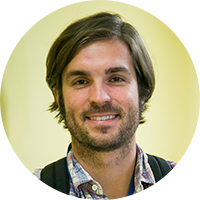
William Davis, George Washington University
I’m studying now for my Master’s in European and Eurasian Studies at George Washington University. I came here for the summer to work on my Russian language skills and also study Russian politics and international affairs – looking not from the outside in but directly here in the country. It’s also important that I can get credits for studying here, which will allow me to finish my degree faster when I get back.
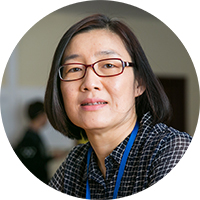
Sowon An, Professor at Seoul National University of Science and Technology
It’s my first visit to Moscow but our students were here last year, so this is our second year of participation in this programme. This year we brought a rather large group to the HSE Summer University. I am certain that this will be a great opportunity for these young people to gain unique experience working together with students and teachers from other countries. It will allow them to expand their horizons and receive necessary experience on the global market.
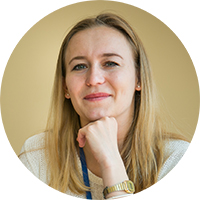
Regina Schneider, Sorbonne
I am studying at Pantheone Sorbonne in Paris where I study Economics and Psychology for my Master’s degree. I’m here to learn Russian. That’s my first priority because I can already understand Russian but I want to write and read it better. I’d also like to learn Russian culture, history and politics. It’s very interesting to be here in Russia at the moment with the political and economic situation. In Europe, we have our information and I find it very interesting to speak with people about what they think.
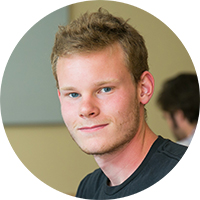
Daniel Thomas, University of Wisconsin
This is my second time in Moscow – I spent last spring here as an intern at the US embassy so I lived here for three months.
I am a Bachelor’s degree student in the United States right now at the University of Wisconsin, I am studying Political Science and I am thinking about if I want to continue on graduate study with that. I am really interested in Russian politics so this may be a great university for me in the future to continue studies at.
When you are here and you experience the culture and meet the people you are obviously going to have a different attitude. It’s different from when you are home and view it from afar and based on what you see in the news and you read. I think there is a different perception than there is when you are actually here in Moscow.
The buddy program has been invaluable; it made my arrival extremely easy, and all of the buddies have been extremely kind and welcoming. The welcome party was also a success. It was great to have all the students gathered in a room, and to hear of everyone’s experiences so far.
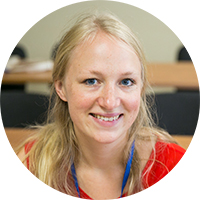
Sarah Wagner, Maastricht University
I am German but I study in Maastricht, in the Netherlands. I did a Bachelor’s in European Studies and I am now studying European international law. I think there is so much misunderstanding because people do not understand. In Germany or the Netherlands, we hardly ever really study Russian – we don’t get a chance to do so. When you study EU – Russia relations, obviously it is from the European point of view. I came here because I will also study EU – Russia economic links – I am interested to see the Russian point of view.
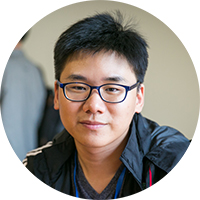
Kim Hanbok, Seoul National University of Science and Technology
I've always been interested in Russian culture, perhaps because we are neighbours, and perhaps because your country is very special - on a huge territory located between Europe and Asia. I started to study the Russian language, although I only know the alphabet. Pronunciation is especially difficult. I hope that during my stay here I will be able to improve it. From a professional point of view, I'm interested in courses in management, business and computer science.
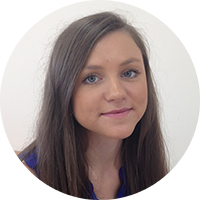
Evgenia Tsbina, Intern at the Summer University (University of San Diego)
Next year I will finish my training at the University of San Diego in the International Business programme with a specialization in Eastern Europe. One of the prerequisites for obtaining a degree is language study and study in the country you have chosen to specialize in. For me it was natural to choose Russian because I was born here. We moved to America in 2007 when I was 17 years old, so I know the language well. A professor at San Diego helped me to get the internship at HSE, giving me the organizers’ contact information. I wrote to Oksana Chernenko, and she invited me to her team. I communicate with students and help them to adapt.
Lyudmila Mezentseva, HSE news service
See also:
HSE UNITY FEST 2025: Cross-Cultural Communication and the Synthesis of Traditions
HSE UNITY FEST, a large-scale, three-day celebration of national cultures, has taken place at HSE University. The event was an opportunity to make new friends and experience a true sense of unity, and visitors could immerse themselves in the cultures of different nations, explore their traditions and values, and take part in workshops and games. Students shared their impressions of the event with the HSE News Service.
Early-Career Researchers Discuss Cooperation between Russia and Arab States
HSE University has hosted a conference entitled ‘Russia—The Arab World: Digital Future and Youth Cooperation,’ organised by the Faculty of World Economy and International Affairs (WEIA). The meeting took place in the run-up to the first Russian–Arab summit, due to be held in Moscow on October 15, 2025.
'We Are Interested in Creating Opportunities for Those Who Are Genuinely Passionate about the Russian Language and Culture'
This year marks the 10th anniversary of HSE University's International Prep Year Programme. Over the past 10 years, approximately 2,000 international students have taken courses offered through the programme. At the core of their educational experience is the study of the Russian language, combined with subjects related to their future specialties, such as mathematics, computer science, literature, and history. In addition, students take part in interactive events organised by the programme. Vice Rector Victoria Panova discusses the origins and development of the HSE International Prep Year, as well as its main purpose.
‘HSE Stands Out for Its Academic Reputation, International Environment, and Approach to Learning’
This year marks the 10th anniversary of the HSE International Preparatory Year programme. The programme offers a one-year foundation course for international applicants preparing to enter Russian universities. HSE lecturers help future students acquire the knowledge and skills needed to successfully undertake a degree programme in Russia.
Surviving as a Korean International Student in Russia: Cultural Differences to Watch Out For
Studying abroad in Russia can be an exciting adventure, especially at HSE University–St Petersburg. As an international student, you might already expect challenges like language barriers and the freezing winter. However, cultural differences often require the biggest adjustments. In this article, we’ll explore specific cultural contrasts between Korea and Russia—from communication style to classroom etiquette—and share friendly tips on how to cope.
Summer University 2023: ‘A Good Introduction to Urban Studies’
At the start of August, HSE University held the tenth annual Summer University. This year’s programme took the form of a workshop on urban studies. The participants attended four courses from HSE University faculty and invited experts and worked on their own projects to develop a cultural heritage site. Jung Woo Lee, from South Korea, shares his impressions of the Summer University.
‘I Have Felt Welcomed Since the Very First Day’
Yohei Shiiba from Japan, Eunsong Gu from the Republic of Korea, together with Luca Volponi and Nicola Bressan from Italy shared their impressions of living in Moscow and studying on the English-taught Master of International Business (MIB) programme, which is open to students from all over the world.
‘Korea for Much of the World Has Been Far Away and Remote, but in the Present, It Seems Closer and at Times Everywhere’
The international conference ‘Korea Uncovered: Global and Local Challenges (late XIX – mid XX century)’ is underway at HSE University on October 7–8. Why do they say that Korea was discovering the world and opening up during this period? The HSE News Service talked about the issues discussed at the conference with its organisers and participants.
‘A Financial Education Takes Your Potential to a New Level’
The admission campaign for the fully online Master of Finance programme is underway. The programme is affiliated with CFA Institute (USA), an international organisation that confers one of the most authoritative titles in the field of finance and investment: Chartered Financial Analyst. Kyung Se Park from Seoul, student of the online Master of Finance programme and co-founder of the LUOES Cosmetics Company, shared his learning experience with the HSE News Service.
‘I Have Always Respected the University’s Comprehensiveness and Inclusiveness’
Throughout July, students of the HSE International Summer University are studying Russian History and Behavioural Economics. The courses are taking place in an online format—something that seemed unthinkable for a summer programme before the COVID-19 pandemic. Recent years have shown that online learning is a unique opportunity for students from all over the world to study with leading HSE University professors from the comfort of their own homes.


